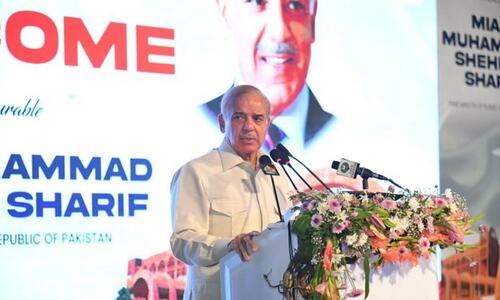• NEC set to approve Rs2.2tr for country’s uplift
• Industrial sector expected to perform better
ISLAMABAD: The prevailing political uncertainty and the International Monetary Fund (IMF) programme-led economic stabilisation efforts are likely to slow down the country’s growth prospects and keep the inflation rate elevated next fiscal year (FY2022-23), as the federal and provincial governments adopt fiscal and monetary tightening policies.
This is said to be the central theme of next year’s macroeconomic framework and development programme to be approved by the National Economic Council (NEC) in its meeting due later this week. Led by the prime minister, the NEC comprises the four chief ministers and as many federal ministers. The Azad Jammu and Kashmir prime minister and Gilgit-Baltistan chief minister also attend the meetings of the country’s highest economic and development policy-making body.
Despite broad-based growth in almost all real sectors of the economy that even surpassed targets, the Planning Commission questioned the quality of economic growth in the current fiscal year, saying it was “primarily fuelled by excessive demand-driven consumption”. The commission’s documents noted the economy surpassed the envisaged target of 4.8 per cent (the target is an old base so might not be truly comparable) with a wide margin and registered a strong growth of 5.97pc in the current fiscal year. This growth was made possible by the agriculture sector contributing 4.4pc, industry 7.2pc and services 6.2pc — all three sectors also surpassed their respective targets.
The Planning Commission expected that “with the likely resumption of the IMF programme, the economic outlook for the next fiscal year is to result in orderly rebalancing between imperatives of economic growth and addressing the external sector vulnerabilities; particularly in the light of extent of global slowdown and the expected abatement of global inflation in commodity prices and the stability of exchange rate movements”.
Fiscal adjustment efforts, addressing the worsening trade balance and mitigating political and economic uncertainty will result in a slowdown of the economic growth, the commission said. “Keeping in view the external and local uncertain economic environment, GDP growth will slightly taper off and is envisaged at 5pc for 2022-23 at the back of agriculture 3.9pc, manufacturing 7.1pc and services sector 5.1pc,” it further said, adding investment will also be moderated because of fiscal and current account compression. “Inflation will stay in the double digits as global inflationary pressures will not taper off very quickly.”
The lower growth of 5pc is also subject to a series of variables. The Planning Commission said the projected agriculture growth at 3.9pc is mainly contingent upon the revival of cotton and wheat production, consistent availability of water, certified seeds, fertilisers, pesticides and agriculture credit facilities.
Also, the elevated industrial performance over the past two years is expected to consolidate, and the augmented production capacity during these years will anchor the growth momentum, however “the growth momentum will be moderated owing to fiscal consolidation efforts”, the commission said. The broad-based revival of large scale manufacturing (LSM) is projected to sustain its growth at 7.4pc during 2022-23.
“There are downside risks of high cost and low supplies of energy inputs, exchange rate-related uncertainties and the Russia-Ukraine war-related supply shocks, which have the potential to impact the manufacturing sector,” the commission observed, projecting the overall manufacturing sector growth at 7.1pc during 2022-23.
It also projected the services sector to be subject to moderation in growth and targeted to grow by 5.1pc next year, which is still lower than its five-year pre-Covid-19 annual average growth of 5.3pc. The expected performance of agriculture and industrial sectors will complement the targeted growth of the services sector.
Investment level for 2022-23 is expected to decrease slightly to 14.7pc of the gross domestic product (GDP) due to stabilisation and uncertain economic environment. Fixed investment is expected to grow by 13pc on nominal basis, however as a percentage of the GDP it will decrease marginally as compared to last year, and will remain around 13pc of the GDP in 2022-23. The National Savings rate is targeted at 12.5pc of the GDP.
The planning commission said the government will pursue fiscal consolidation, and efforts will be made to bring down the fiscal deficit through a combination of revenue enhancement and expenditure management policies. “The monetary policy stance will remain vigilant and supportive of the demand management policies,” it said, adding the external sector was expected to improve upon import compression measures, while export outlook will be impacted by global demand compression and increasing protectionism tendencies in the world.
The government’s principal economic body is also expected to formally approve next year’s national development programme, recommended by the Annual Plan Coordination Committee (APCC) at about Rs2.2 trillion, including a lower than the current year’s federal Public Sector Development Programme (PSDP) of Rs800 billion. Till the filing of this report, the proposed PSDP was under review at the Prime Minister Office for inclusion of fresh development schemes to satisfy coalition partners.
Published in Dawn, June 7th, 2022



































